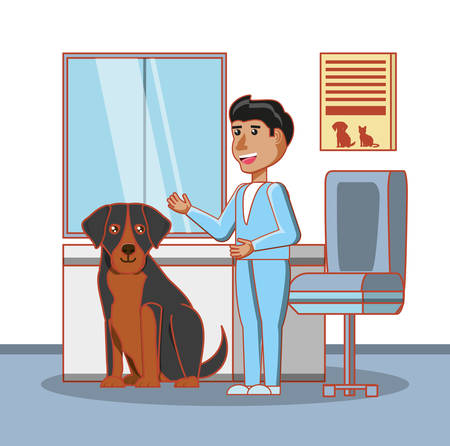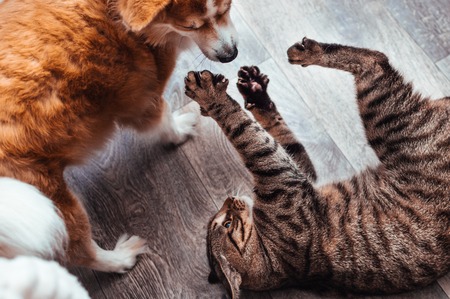Importance of Vet Care for Family Pets in Indian Homes
In the heart of every Indian home, our pets are not just animals—they are cherished family members. When there are children in the house, this bond grows even stronger, with pets often becoming best friends and loyal companions to little ones. Regular veterinary care is essential for keeping our beloved furry friends healthy and happy, especially in households bustling with kids. Timely check-ups and vaccinations help prevent diseases that can sometimes be transmitted between animals and humans, ensuring a safe environment for all. Prioritising vet visits shows our commitment to their well-being and teaches children the importance of compassion and responsibility. In India’s vibrant culture, where families love to celebrate togetherness, maintaining our pets’ health through trusted vets helps nurture deeper relationships—making every moment shared at home more joyful and secure.
2. Common Pet Health Concerns in Indian Households
Living with adorable fur babies in India brings immense joy, especially when little ones are around. However, Indian homes present unique challenges for pet health, shaped by our vibrant culture, diverse climates, and lively family environments. Lets explore some of the most common health concerns that pets face in Indian households, particularly those where children and pets share their days filled with playfulness and cuddles.
Climate-Related Health Issues
Indias weather swings from scorching summers to chilly winters and heavy monsoons. Such changes can impact your pet’s health in many ways. For example:
| Season | Common Pet Concerns |
|---|---|
| Summer | Heatstroke, dehydration, tick & flea infestations |
| Monsoon | Fungal infections, ear problems, muddy paw issues |
| Winter | Joint pain (especially in older pets), respiratory infections |
The Role of Diet in Pet Well-being
Many Indian families love to share home-cooked treats with their pets. While our chapatis and curries may delight us, not all human food is safe for cats and dogs. Pets need a balanced diet rich in protein and free from spices or ingredients like onions and garlic, which can be harmful. Consulting your vet about the right nutrition plan tailored to both breed and local availability is essential for keeping your furry friend healthy.
Interaction with Kids: Blessings & Cautions
The bond between children and pets is magical—full of giggles, learning moments, and endless affection. However, kids may unintentionally expose pets to rough handling or unsuitable foods. Common issues include accidental ingestion of toys or snacks, stress from excessive noise or play, and minor injuries during playtime. Teaching children gentle ways to interact with their animal companions protects both your child and your pet.
Cultural Practices & Urban Challenges
In some Indian households, traditional remedies or folk practices are used for minor pet illnesses. While these are part of our heritage, it’s always best to consult a qualified veterinarian before trying home treatments. Additionally, urban living often means limited space for exercise or exposure to pollution—both factors that can influence your pet’s long-term well-being.
Summary Table: Key Pet Health Concerns in Indian Homes
| Concern Area | Example Issues |
|---|---|
| Weather/Climate | Heatstroke, fungal infections, joint pain |
| Dietary Habits | Poor nutrition, toxic food exposure |
| Kid-Pet Interaction | Toy ingestion, minor injuries, stress |
Caring for pets in homes with kids in India requires awareness of these unique challenges. By staying informed and maintaining regular contact with a trusted vet, you can ensure your furry companions remain healthy and happy—ready to fill every day with purrs and wagging tails!

3. Safety Tips for Kids and Pets in Joint Living Spaces
In the vibrant heart of Indian homes, where laughter and pitter-patter of little feet mingle with the soft mews and gentle tail wags, creating a safe environment for both children and pets becomes an act of love. As a devoted pet parent, I know how important it is to nurture harmony when our furry companions share their space with young ones. Here are some gentle strategies, inspired by Indian family values, to ensure every member – two-legged or four – feels secure and cherished under one roof.
Teach Respectful Interactions Early
Children are naturally curious about animals. Encourage your little ones to approach pets softly, using calm voices and gentle hands. Demonstrate how to stroke a cat’s fur or offer a dog a treat, always under supervision. In Indian culture, teaching compassion and ahimsa (non-violence) begins at home – let this extend to your pets as well.
Create Safe Zones for Pets
Just like we cherish our cosy nooks for chai breaks, our pets too need a quiet retreat. Set up designated pet spaces where your furry friend can relax undisturbed. Whether it’s a sunny corner with a soft mat or a basket tucked away from busy play areas, these safe zones help prevent accidental tugs or scares.
Establish Clear Household Rules
Simple rules go a long way: no pulling tails, no disturbing pets while they eat or sleep. Use playful reminders and stories from Indian folklore about animal friends to help children remember boundaries. Regular family discussions reinforce these values, making safety a shared responsibility.
Keep Cleanliness Top of Mind
Indian households take pride in cleanliness, especially when little hands explore everywhere! Teach kids the importance of washing hands after playing with pets. Regular grooming and timely vaccinations—guided by your local vet—keep everyone healthy and happy.
Supervise Playtime Always
No matter how gentle your pet or child may be, never leave them unsupervised during playtime. Active monitoring prevents misunderstandings and allows you to gently correct behaviours on the spot—making every moment together joyful and safe.
By embracing these thoughtful strategies rooted in Indian family life, you weave a tapestry of trust and affection between your kids and their beloved pets. And remember, when questions arise about behaviour or health, reaching out to your neighbourhood vet ensures peace of mind for the entire family.
4. How to Contact a Qualified Vet Near You
When your beloved pet needs medical care—especially in homes with playful children—it’s essential to find an experienced and compassionate vet nearby. In India, the process is becoming easier and more convenient, thanks to both traditional methods and digital trends. Below are locally relevant steps tailored for Indian families seeking trustworthy veterinary care:
Step-by-Step Guide to Finding a Vet
- Ask Your Neighbours & Colony Welfare Groups: Word of mouth remains powerful in Indian communities. Speak to fellow pet parents or members of your Resident Welfare Association (RWA) WhatsApp group for recommendations.
- Use Popular Indian Apps & Websites: Platforms like Practo, Justdial, UrbanClap (now Urban Company), and Pawspace allow you to search for nearby vets, read reviews, and even book appointments online.
- Contact Local Veterinary Hospitals: Government-run facilities such as the Animal Husbandry Department clinics or city municipal hospitals often offer affordable services. You can check their timings and contact numbers on state government websites.
- Check Social Media Pet Groups: Facebook groups like “Pet Parents India” or city-based Telegram channels regularly share vet contacts and reviews based on real experiences.
- Visit Pet Shops & Boarding Facilities: Local pet stores often have tie-ups with reputed veterinarians and can provide referrals based on your needs.
Useful Resources at a Glance
| Resource | Description | How to Use |
|---|---|---|
| Justdial | A popular business directory in India for searching local services | Search “veterinarian near me” and filter by ratings/location |
| Practo | Health app listing verified doctors including vets | Book appointments directly; read user reviews |
| Pawspace | A platform for pet care including home visits by vets | Select “at-home vet visit” service in your city |
| Animal Husbandry Department | Government-run clinics, especially useful in Tier 2/3 cities | Find clinic addresses and timings on official website |
| Your RWA Group/Neighbourhood WhatsApp Group | Community network for recommendations and emergency support | Post queries or search past messages for vetted contacts |
Tips for First-Time Pet Parents in India
- If possible, choose a vet who speaks your regional language for clear communication.
- Always confirm if the vet offers home visits—a growing trend in Indian metros!
- Certain apps provide tele-consultation options; perfect for quick advice when kids are around.
- Keep your pet’s vaccination record handy—many Indian vets now maintain digital health cards.
Cherishing Pets as Family in Every City Lane…
No matter if you’re in bustling Mumbai or a peaceful Kerala town, finding the right vet is about blending trust, convenience, and that heartwarming Indian sense of community—for the safety of both our furry friends and our little ones.
5. What to Expect During a Home Vet Visit
Inviting a veterinarian into your home in India is a thoughtful step towards ensuring your pet’s health and happiness, especially when little ones are around. The experience is designed to be as stress-free and homely as possible for both your furry companion and your family members.
Warm Welcome and Initial Assessment
When the vet arrives, they usually greet everyone—including the pets—with gentle words and calm gestures. This helps create an atmosphere of trust, which is especially important in Indian households where pets are considered part of the family. The vet may sit down with you, ask about your pet’s daily routine, diet, and any recent changes in behaviour, all while making sure your child feels involved and safe during the conversation.
Gentle Examination in Familiar Spaces
The examination typically takes place in a familiar room where your pet feels most comfortable—often near their favourite window or on a soft mat. Indian vets understand that loud noises or unfamiliar smells can be overwhelming, so they use soothing voices and minimal equipment. Kids are encouraged to observe or even help hold their furry sibling’s paw under supervision, making it a gentle family experience.
Personalised Advice and Family Guidance
After examining your pet, the vet provides tailored advice on nutrition, preventive care, and ways to maintain harmony between children and animals at home. They might share desi tips such as using turmeric for minor wounds or suggest local brands of pet food suitable for Indian climates. The vet also guides kids on how to interact lovingly and safely with their pets—teaching respect and kindness as core values.
Smooth Procedures with Minimal Disruption
If vaccinations or minor treatments are needed, these are done swiftly with utmost care. Vets carry portable kits stocked with necessary medicines, often bringing along treats sourced from trusted Indian brands to reward brave pets after procedures. The goal is always minimal disruption to your daily routine—a true blessing for busy Indian families juggling school tiffins and work-from-home calls.
Comforting Closure and Follow-Up Support
Before leaving, the vet makes sure all questions are answered, leaves clear instructions (sometimes even in regional languages), and shares contact details for follow-up queries via WhatsApp or phone—so you’re never alone in caring for your pet. This empathetic approach creates lasting bonds between vets, pets, and families across India’s diverse communities.
6. Nurturing Healthy Habits: Ongoing Pet Care at Home
Creating a loving and healthy environment for your furry companions is an ongoing journey, especially in Indian homes bustling with children’s laughter and family traditions. Encouraging gentle routines not only supports your pet’s well-being but also helps children develop empathy and responsibility. Simple practices like establishing a daily feeding schedule using stainless steel bowls (common in Indian households), ensuring fresh water is always available, and including your kids in these tasks can turn ordinary moments into special bonding experiences.
Embracing Cultural Traditions in Pet Care
Indian culture thrives on rituals—so why not weave pet care into them? During festivals such as Diwali or Pongal, involve kids in preparing safe spaces for pets to rest away from noise. Teach children to greet pets gently each morning, just as they would touch elders’ feet out of respect, fostering kindness and mindfulness from an early age.
Family Activities that Strengthen Bonds
Let playtime become a cherished family ritual. Gather in the verandah or rooftop after evening prayers for interactive games with your dog or cat. Use locally available toys, like fabric scraps or homemade balls, making sure they are safe and suitable for your pet. Assign small tasks to children—like brushing the pet’s fur or filling their bowl—so everyone feels included.
Simplifying Daily Routines
Keep pet care straightforward by following routines that fit your family’s lifestyle. A quick sweep around your home after meals keeps the floor clean for crawling babies and playful kittens alike. Encourage handwashing after playing with pets—a habit that blends seamlessly with the Indian tradition of cleanliness before meals.
Learning Together and Growing as a Family
Every day is an opportunity to teach children about compassion and care. Share stories about animals from Indian folklore or local tales during bedtime, nurturing a sense of respect for all living beings. And whenever you notice changes in your pet’s behaviour or health, model responsible action by contacting your trusted vet—showing kids the importance of seeking help when needed.
A harmonious home, filled with purring cats or wagging tails, grows from mindful habits rooted in love and togetherness. By weaving simple, culturally mindful routines into daily life, you nurture not only healthier pets but also happier, more compassionate children.

